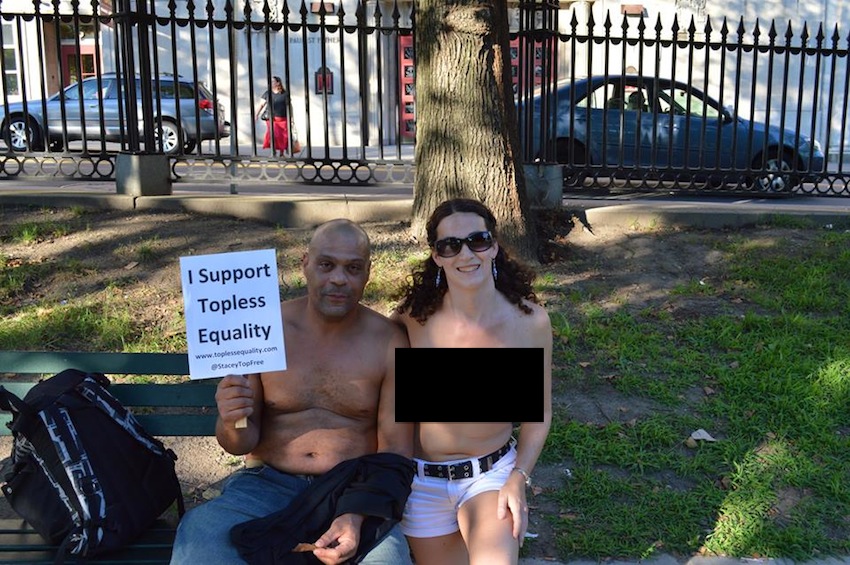Women Want to Bring ‘Go Topless Day’ to Boston in August
There’s a 50/50 chance that the Boston Common could become the stomping grounds for a group of topless women later this month.
August 25 marks national “Go Topless” day, where women from dozens of cities across the country will bare it all in public—some risking arrest—to advance a woman’s right to walk around half-nude. The annual “Go Topless” day always falls around the time of Women’s Equality Day, which marked the passage of the 19th Amendment, in 1920, allowing women to vote. Now, the movement is trying to reduce the gender gap when it comes to accepting that females have as much right to walk around shirtless as their male counterparts.
For Worcester resident Stacey, who didn’t want to use her last name, the shirtless-movement has already started, however. “Men can take their shirts off anywhere they want. Why can’t women? It’s simple discrimination against half of the population. Is it not? It seems that way to me,” she said.
Stacey recently became the spokesperson for the Massachusetts chapter of ToplessEquality.com, separate from the GoTopless organization, but she is hoping to work with the group to bring their national event to Boston for the first time. “There hasn’t been an official connection yet, but we are trying to get such an event to happen in Boston. But it’s of course difficult to get anything to happen here because bureaucracy is that way,” said Stacey. “This is something I have always felt was wrong, that women can’t go topless and men can, and I would love to see it happen in Boston.”
Representatives from GoTopless confirmed that there has been some vested interest to get bare-breasted women together to celebrate the occasion and advocate for equal rights. “GoTopless season 2013 has indeed begun, and many people have started to reach out to us to organize an event in their city in honor of Women’s Equality Day. Boston will no doubt be on the list,” a spokesperson said via email.
Meanwhile, Stacey continues to push the topic—and some peoples’ buttons—by walking around without a shirt on in Worcester and running the ToplessEquality Twitter account and Facebook page for Massachusetts. She said when she is topless in public, the reaction from most people has been “very good,” and they seem supportive of her initiative, both men and women alike. But there are a few who are very loudly outspoken against it, and they call the cops, yelling angrily that there is a naked woman walking down the street. “It causes hassles and problems. People don’t understand the difference between fully nude and shirtless,” said Stacey.
The other problem is that laws are vague about what is required to cover up the female breast in some places, and local ordinances conflict with state laws, or can be interpreted in different ways in terms of the definition, she said. “It makes it really tough to be legal, though.”
Under state law, “nudity” is defined as the following:
Uncovered or less than opaquely covered human genitals, pubic areas, the human female breast below a point immediately above the top of the areola, or the covered male genitals in a discernibly turgid state. For purposes of this definition, a female breast is considered uncovered if the nipple or areola only are covered.
This definition puts people who may want to partake in the topless activities at the end of August at risk—if the plans come together—a problem that was recently dismissed in places like New York City, where officials have vowed not to arrest women who walk the streets without shirts on during the August 25 protest and equal rights celebration.
But Stacey has already tested the topless waters. She was in Boston last Friday afternoon walking around with signs, handing out cards stating the group’s mission, and taking pictures with anyone who asked. One cop bothered her a little bit, she said, but another said “you’re fine, no worries,” because she had pasties covering her nipples. “It makes it much harder to prosecute someone when the nipples are not showing, but I was potentially topless according to the law,” she said of her stroll through the Common, just yards from the State House where the rules were created. “If I was wearing a string bikini, people wouldn’t give it a second thought, which is the strangest thing … that’s why women should just absolutely have the same rights as men in the state. Anywhere a man can go topless a woman should be able to go topless, too. It’s just too much discrimination.”


